When I started Pius X High School in 1967, I was used to being a misfit and a geek. I’d had a lot of experience and I guess I was good at it. Nevertheless, I was determined to change my fortunes, and decided it must be possible to reinvent myself.
I’d picked up two pieces of advice that I thought were going to turn things around for me: “If you want to have a friend, be a friend,” and “Look up, smile and greet everyone you see with a great big hello.” So I prepared myself to be the bestest friend anyone ever had, and I looked up and I smiled and greeted everyone with a great big hello. The strategy failed miserably. Nobody wants a geek and a misfit meeting their eyes, smiling and saying hello. It’s embarrassing. So I never got to be a friend or have one.
In the food chain of the school hierarchy, I was plankton. At the top of the chain were the jocks, mainly the football players. They had short hair and wore red lettermen’s jackets and amused themselves by bullying the smart kids. Under them were the cheerleaders. (But not always literally. There was still a lot of virginity around.) To be a cheerleader you had to be well-scrubbed looking, preferably with blond hair, know how to giggle and shriek, and be very good at bullying the smart kids. Below them was the drill team, a group of about fifty girls who came out and did little semi-choreographed routines during half-time at the football games. It was okay to be ugly on the drill team, but I still didn’t make it past the first round of auditions.
I was not the only geeky misfit in the school of course, but the nature of being a misfit meant we were isolated. We were so busy trying not to attract too much attention, that we never noticed each other. For that, we would need a catalyst.
There was a part-time French teacher at our school called Mr. Ford. He was supplementing his income as an actor and director at a small shop front theatre in Orange County called the South Coast Repertory Company. It eventually became one of the most important theatres in Southern California.
Every year for the previous four years, the school had asked Mr. Ford if he would start up a Drama Department, and every year he said no. He took theatre very seriously and was not about to take on a bunch of snot-nosed kids to stage another badly acted version of "Oklahoma", in front of cardboard scenery, with Sister Therese Martin, the music teacher, coaching them to sing “The Farmer and the Cowman Can Be Friends”. Finally, Mr. Ford made them an offer they could only refuse. He would start up a Drama Department if they would give him complete carte blanche to run it in his own way. Astonishingly, they did not refuse.
Now, Pius X was a liberal Catholic school in liberal times, just a few years after the Second Vatican Council shook up the Church and brought in the English Mass which had us singing during the Eucharist, “Eat His body, Drink His Blood, And we’ll sing a song of love. Alleluia!” (It was hard at those times not to yearn for the Latin Mass and the comfort of not knowing what we were singing.)
Maybe because, or maybe in spite of, the fact that it was an overwhelmingly working class high school, we were part of the Model Schools Program which attempted to address the problem of youthful lack of motivation by having individually tailored curricula. Students still had required courses, but they were in charge of “booking in” their own class “modules” each term in order to meet those requirements. This didn’t proceed without hitches, however, and in my senior year I realised that I could not take both my required PE and my required Biology as they were scheduled at the same time. I had to go to the Head of Studies to ask for an exemption from PE. He shook his head.
“Why didn’t you plan for this possibility?” he asked me.
“Because I didn’t think it would happen,” I protested. He looked at me conspiratorially.
“Did you know,” he said quietly, “that the United States has a plan to invade Canada?” No, I did not know this. “Now who would think we’d ever be at war with Canada? But they have a plan for that eventuality.”
He was bonkers of course, but he did give me my exemption which I was delighted about since I hated PE (ironically, I could not have played it better if I’d planned it). My friend Richard DeAtley thought it was so funny he started singing: “Look at Montreal, Nothing left at all! Smoke gets in your eyes.”
We even had a Preparation for Marriage class which included sex education, complete with films of fish-like creatures approaching what looked like a Sun God (nothing on birth control, though, for obvious reasons). It was taught by a Catholic gynaecologist called Dr. Plymouth who had great faith in the value of sex education and pronounced himself satisfied that such mature students as ourselves wouldn’t be tempted, armed with said knowledge, to “go out and experiment.” His trust was a bit misplaced, however, and every time I passed Ron Shaheen’s desk I would pass him a note which read, “Hey, want to go out and experiment?” We didn’t, of course, but it would have been fun to see what Dr. Plymouth thought if he’d ever intercepted one of the notes.
I feel bad about it when I look back, because he seriously didn’t deserve it. I remember when he was talking about the Wedding Night (the first time the man and the woman have ever had sex, of course), he advised the boys, as discreetly but unmistakably as possible, that their future wife might not achieve satisfaction with intercourse alone and that a sensitive husband will ensure his wife achieves this beforehand. I mean this was before feminism hit the bedroom! Before the Hite Report! If those boys were listening that day, their wives and lovers should be lobbying the Vatican to make Dr. Plymouth a saint!
And so the new Drama Department was born. It held no attraction for the jocks or the cheerleaders or the drill team or anyone who’d found their niche on our little campus. It attracted the misfits.
There was Mike Chapman who was slightly built and uninterested in sports. There was Lari Pittman who “crossed over” from the Art Department. There was Ron Shaheen who was of Lebanese extraction, Glenn Thompson, one of the only black kids at school, Kitty Felde who was flaky and intense at the same time, and my wonderfully kooky sister, Nancy. There was Phil Alvin who was a misfit by choice as he aspired to be a blues musician and had to look after his cred, the motherless Joe LeChuga, the neurotic Julie Palardy, and even John Shepard who had been a misfit in the football team. And there was Richard DeAtley, a gauche, nervous boy who always looked uncomfortable in his own skin, was incredibly bookish, and tried to flirt with girls (including me) by reciting lyrics from the Mothers of Invention:
“His wife’s attending an orchid show
She squealed for a week to get him to go.
Now he’s in bed with his teenage queen,
Rocking and rolling and acting obscene.”
Richard never managed to have a girlfriend all though high school.
I suppose when we signed up for Mr. Ford’s drama class, we thought we’d be rehearsing "Oklahoma", building cardboard scenery, with Sister Therese Martin coaching us to sing “The Farmer and the Cowman Can Be Friends.” But Mr. Ford insisted we were going to create something called “Art” and that we were going to be “artists”.
Mr. Ford must have been in his early thirties then. His clothes were clean but dishevelled looking, with a studied air of bohemian casualness (which was probably nothing of the sort. I suspect he just was the kind of person who didn’t know how to wear clothes). He was worldly wise, passionate, and intensely charismatic. Within months, we would have done anything for him.
The secret of reaching teenagers, which few grown-ups ever remember past the age of twenty-one, is to treat them like adults. No quarter was ever given because we were technically “children”. Our first production was Friedrich Durenmatt’s “The Visit”. We rehearsed almost every day after school. We built proper sets with flats; and we were allowed to make mistakes before we got things right. (Richard DeAtley spent weeks trying to work out how to make a two-fold, a corner flat unit, that wouldn't fall down.) We made or own cyclorama, a screen that surrounded the whole stage and could be lit, with cheap muslin sewn together and dyed light blue. Mike Chapman did a proper lighting design with dozens of lighting cues.
When some of the parents became seriously irritated that Mr. Ford was demanding so much of our time (which was freely given), he was called onto the carpet by the school administration and forced to curtail our hours. We drove down in a convoy to his house in Santa Ana out of solidarity; and he cooked spaghetti for the whole lot of us. We adored him!
On opening night of our two night run, it was standing room only. Every parent, grandparent, friend, uncle, auntie and godparent of every one of us was there. The school administration was now boasting about how hard we’d all worked and couldn’t wait to see the result.
The lights went down. The play opened. The train arrives with the millionairess Clare Zachanassian on board. She promises to save the impoverished town on one condition. She demands the life of the lover who once betrayed her: Anton Schill. The villagers refuse, but little by little they start to spend money on credit. Anton Schill becomes increasingly uneasy. Clare is unrepentant and, as she leaves the stage just before the first act curtain she cries, “The world turned me into a whore, I shall turn the world into a brothel!” "Oklahoma" it wasn’t.
I think a lot of the parents, grandparents, friends, uncles, aunties and godparents were not expecting this. And to this day I’m not sure how we got away with it.
Mr. Ford had huge enthusiasm for European as well as American theatre, and told us that the most exciting theatre was happening in London. We went on to attack ever more difficult texts, Albee’s “The Zoo Story”, Giraudoux’s “Intermezzo”, Van Itallie’s “America Hurrah”, Sartre’s “No Exit”, Pirandello’s “Six Characters In Search of an Author”, Genet’s “The Maids”. We forged a unique identity, calling ourselves “Theatre Tech”, and built ever more complex sets, staged ever more complex productions, and even made a film, a collection of short scripts we’d each written, called "Let My People Go". (Don't ask me. I don't know why.)
In my senior year I wrote a play called “The President is Dead" which I directed. It was about seven people who get trapped in a bunker under Washington after a nuclear war: a general, a nuclear physicist, two militant war protestors, a secretary, a National Guardsman and a sociologist. They eventually start a war with each other. The experience of writing it, of seeing it performed, was life-changing.
But Mr. Ford was strangely less encouraging about my writing than he had been about my acting. Watching a rehearsal of the play he said, “I know what this play reminds me of! Gilligan’s Island!” (a popular sitcom) I desperately craved his approval, and his remark crushed me.
Nevertheless, writing for the theatre became more and more important to me, and I became more confident about expressing my aspiration to do it.
“You can’t be a writer!” he laughed one day, “You haven’t got the temperament for it. You’re a people person!” I was beginning to think he was abusing the charismatic power he held over me, but I never said anything.
Eventually, of course, we graduated from high school and from “Theatre Tech” and went our separate ways. A lot of us stayed in touch for a long time after that, though, and we’d visit Mr. Ford from time to time. He told us to call him Paul, but we could never bring ourselves to do it, really.
One night he took me and another of his former students to a Theatre Restaurant (which was then very novel) where, for the entertainment of guests, women were made to assume second class status and to act as serving wenches. My mother had had to fight that second class status all her life and I just didn’t think it was funny.
“Oh come on!” he said, “You’re not the feminist type!” It rankled. Again, I said nothing.
By this time a lot of the guys who had been part of “Theatre Tech” began coming out; Lari, Mike, Ron. It’s no wonder so few of the girls in the drama department had boyfriends! When Ron came out to Mr. Ford, he became uncomfortable.
“Why,” he asked Ron, “under the circumstances, did you let me undress in front of you when we were in the dressing room?” I was shocked that Mr. Ford could take that attitude, not just politically – he was supposed to be some sort of bohemian artist after all – but as Ron’s friend.
The last time I saw Mr. Ford was maybe ten years later. He had moved to the Bay Area and owned a flower shop. I had arranged a stopover to see him on my way back to Southern California for Christmas.He picked me up at the airport and before we even left the terminal he told me he’d directed his first play in years.
“What play?” I asked, intrigued.
“The Birth of Jesus Christ.” Our charismatic, bohemian teacher had become a fundamentalist Christian.
I could understand where he was coming from, I suppose. All the time we had known him, he told me, he’d been an alcoholic. One day, he asked for God’s help, even though he didn’t believe, and God touched him. What I didn’t understand was that he now seemed to have the need to renounce who he’d been back then, and the incredible influence he’d had on all of us.
“I was very cynical,” he said to me, “I’d hate to think I passed that cynicism on to you.”
This made no sense to me. He passed on passion to us. He passed on determination. He passed on a belief that, despite our unprepossessing backgrounds, we could be “artists”; we could go out and do something amazing.
Nevertheless, we stayed in touch for years and always exchanged Christmas cards. He could never bring himself to be all that encouraging about my writing, even when I became an “award-winning” writer. I once sent him a video of my TV serial, and he sent me a critique, damning it with faint praise.
He eventually went back to semi-professional theatre, acting in musicals, of all things. Like "Oklahoma". He never did serious theatre again.
Over the years our contact grew more infrequent until I didn’t even get the annual Christmas card any more. A few years ago his wife emailed me through my agent. She’d been trying to track me down for two or three years – to tell me that Mr. Ford had died of a brain haemorrhage.
News spread quickly through his former students. But there was no funeral to attend. No memorial service to go to. And maybe most of us wouldn’t have gone anyway, I don’t know. But, whether he’d valued it or not, he’d left us a precious legacy; the courage to dare.
Lari became a well-known artist. John became an actor and worked on Broadway. Richard became a successful journalist and worked at the Associated Press in New York. Kitty became a radio personality on NPR. Mike worked in the costume department of Hollywood movies. Phil and his brother formed what was arguably the hottest band in Los Angeles. And I went to London and became a writer.
It’s a very lonely job though. And I’ve discovered that I’m not that well suited to it temperamentally. I think I’m too much of a people person.
If you would like to comment on this post, please click on the word "Comments" below.





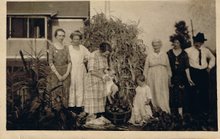
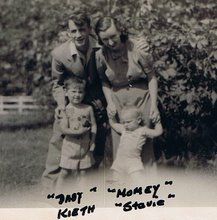

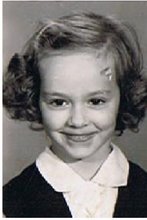
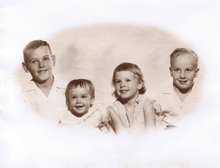
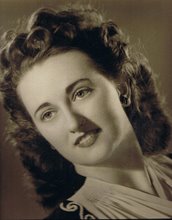
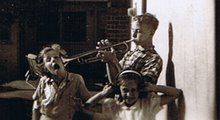
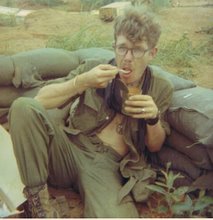
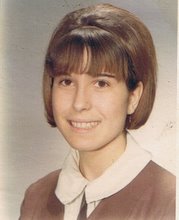
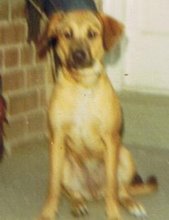
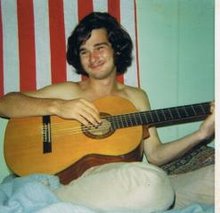
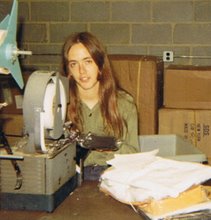
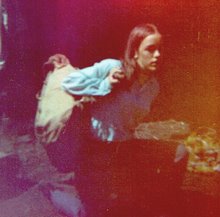

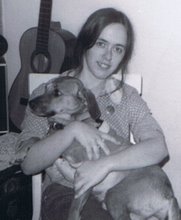
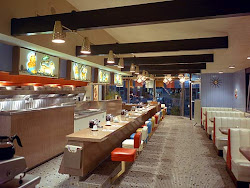

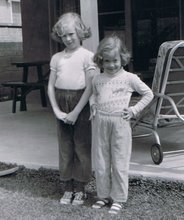
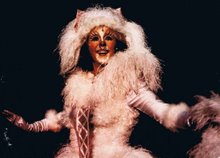
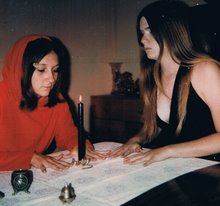
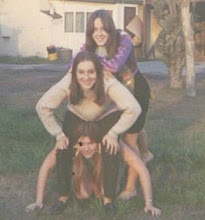
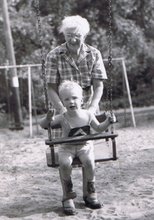
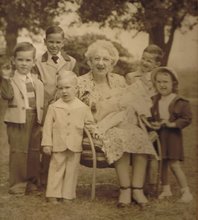
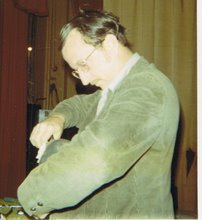
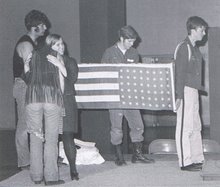
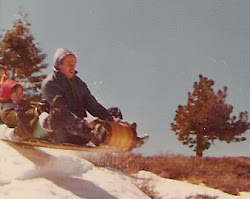





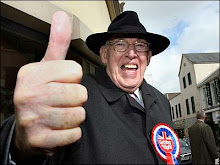


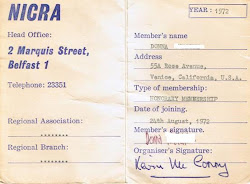
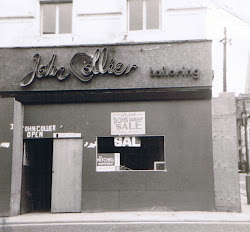
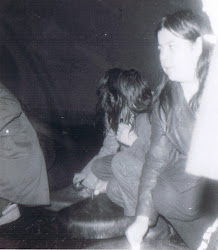

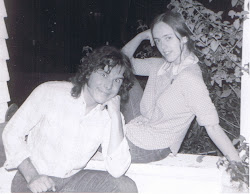
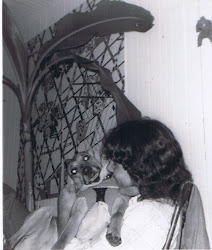
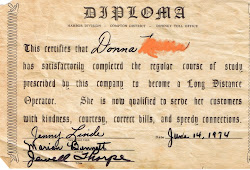




3 comments:
I found your blog facinating. It reminded me of a high school physics teacher that sort of kick started my mad scientist but with character and comedy style, which I sort of still retain to this day (aged 34 m2f intermittent tv lesbo person! - who works as a science/gadget IT consultant for the Health Service in England).
thank you for writing, and never lose the identity and confidence which had turned you from that nerd, into the the capable woman that you now are. Trisha x
Is every thing okay with you? I found yor blog to be gripping. I'm from Northern Ireland. I'm guessing roughly the same age, so I can relate entirely to what has been pissing you off. I think I would be right in saying many people would dearly want to hear much more from your invaluable insights. Get back out there girl - keepon rockin in the free world!
Uhh, I clicked on your blog because the word "Madwoman" caught me eye. Then "Pius X" and names out of my yearbook. Ronny Shaheen. Freshman year. He tried to make me his girlfriend by following me everywhere and making his presence embarrassing. He actually wrote an opera about what a bitch I was to ref use him. Sister Therese:hated me, as did Sister Mary Alexandrine,Sister M. Elizabeth,and a few other Sisters of the Holy Faith. Madwomen. Father Aspinall threw a desk as us in English class. The day Robert Kennedy was shot my friends & I ran out of school crying our eyes out and we did not even know why.
Post a Comment